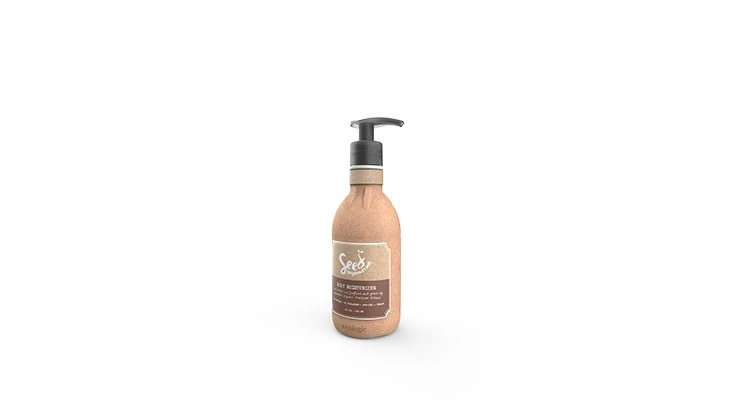
Julie Corbett didn’t start her career as a “packaging person.” Most of her career was spent in the investment industry.
However, after helping her kids with a waste reduction project for their school, she became interested in packaging and recycling.
“We had to weigh our trash at the end of the week and the classroom with the least amount of trash won a pizza party,” she says. “This was over 10 years ago, but in the end, I was trying to go down the aisles in the supermarket and buy better packaging because I started to realize what was and wasn’t recyclable.”
Through this research, Corbett says she recognized that there weren’t enough sustainable packaging options available. “For as many choices you have in the products you buy, when it comes to packaging, it’s mostly the same,” she says. “Either you buy a pouch, which is unrecyclable but obviously less material, and laminated paper structures. So, I was shocked.”

Around that time, Corbett says she learned about how materials bonded together—such as plastic to paper or metal to plastic—are not recyclable. She connected with a friend who works at Waste Management to better understand the recycling situation in the United States, and she learned about contamination issues that occur at material recovery facilities (MRFs).
Having been raised in a small town north of Quebec City, Quebec, where forestry is big, Corbett says she knew paper producers tend to be some of the largest recyclers of paper, as well. “It’s healthier than plastics,” she says. And after seeing that Apple offered a molded paper tray with its iPhone products, Corbett says she was inspired to develop something that would change the packaging industry.
Corbett launched Ecologic, Manteca, California, in 2008 to develop paper packaging for things that are typically packaged in plastic. The company offers paper bottles for things such as personal care products or detergent bottles.
Recycling Today connected with Corbett to learn more about the Ecologic brand and the company’s goals for 2019.
Recycling Today (RT): So, what kind of paper do you use to make your packaging?
Julie Corbett: [They’re] made from recycled content. So, we use [old corrugated containers] OCC and [old newspapers] ONP. We use paper from the waste stream. With L’Oreal, we are creating a circular waste loop where we’re taking the waste from their box factory. It’s a box-to-bottle solution. We’re taking their old corrugated containers, which are actually quite contaminated believe it or not, and it’s a closed-loop solution. We’re taking their waste, upcycling it into a bottle for one of their most premium offerings.
RT: Some plastic is used in Ecologic packaging—could you share the breakdown of what’s included in most Ecologic packaging?
Corbett: It’s OCC, ONP and [postconsumer recycled] PCR plastic. Of the entire structure, it depends on the format and how large it is. But for example, with our Seed Phytonutrients bottle, it’s 60 percent less plastic in one format. The whole shell is 100 percent PCR and the liner is 80 percent PCR.
RT: So, can your packaging solutions be recycled by consumers?
Corbett: Yes—every bottle includes a depiction on separating it. After [the consumer] finishes the product, they crack it open. It’s relatively easy to do. With [our] L’Oreal bottle, L’Oreal is putting a seed pack inside the container to incentivize people to crack it open so they can plant the seeds. I think we really need to have consumers more engaged in the process. The idea of wishful thinking is not going to solve our problem. If the consumer can help at the front-end stage, it helps everyone tremendously.
RT: How has Ecologic evolved over the years?
Corbett: We did our first consumer tests in 2010. Things took off in 2011 when Seventh Generation came to the table with us. At that time, there were issues with manufacturing—not the products. So, in 2015 we took a bit of a break from taking customers to address the manufacturing issues. Greg Rodrigues, CEO, has focused on building a state-of-the-art back end system, infrastructure that could adapt to high-speed manufacturing. So, we relaunched with L’Oreal in April 2018. We’ll be launching with other [consumer packaged goods] soon because of the infrastructure improvements we made. We’re growing rapidly at the stage we’re at now, becoming a bigger attraction to brands looking for innovation in general and less plastic consumption. You’ll probably see an Ecologic solution in the aisles of supermarket stores over the next three to four years.
RT: What are some of Ecologic’s goals for 2019?
Corbett: We’re still small in the grand scheme, but as we scale, we’ll become a bigger buyer [of materials] in the Manteca area. There are plenty of MRFs here. We’ll be a more reliable buyer with volumes. We’re building demand for products—it takes time to develop these products. We’re on track to buy more OCC, though. And by the end of this year, we’re investing in a pulper to handle more mixed paper bale. There’s such a lack of demand for mixed paper, so we’re investing in a system that will allow us to handle more contaminated mixed paper. We’ve discussed this for a long time, but we’re securing funding for it.
Latest from Recycling Today
- AF&PA report shows decrease in packaging paper shipments
- GreenMantra names new CEO
- Agilyx says Styrenyx technology reduces carbon footprint in styrene production
- SABIC’s Trucircle PE used for greenhouse roofing
- Hydro to add wire rod casthouse in Norway
- Hindalco to invest in copper, aluminum business in India
- Recycled steel price crosses $500 per ton threshold
- Smithers report looks at PCR plastic’s near-term prospects






